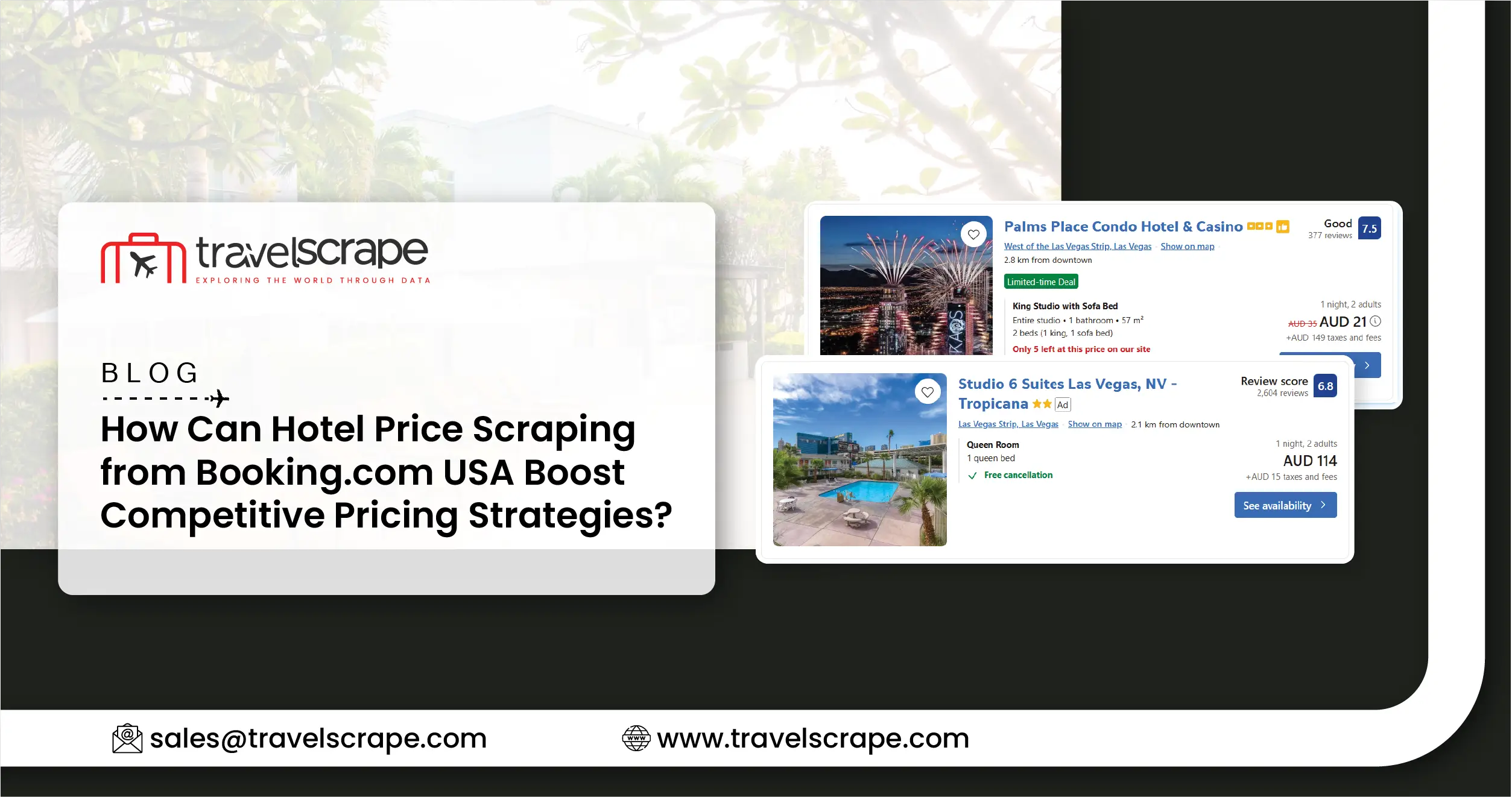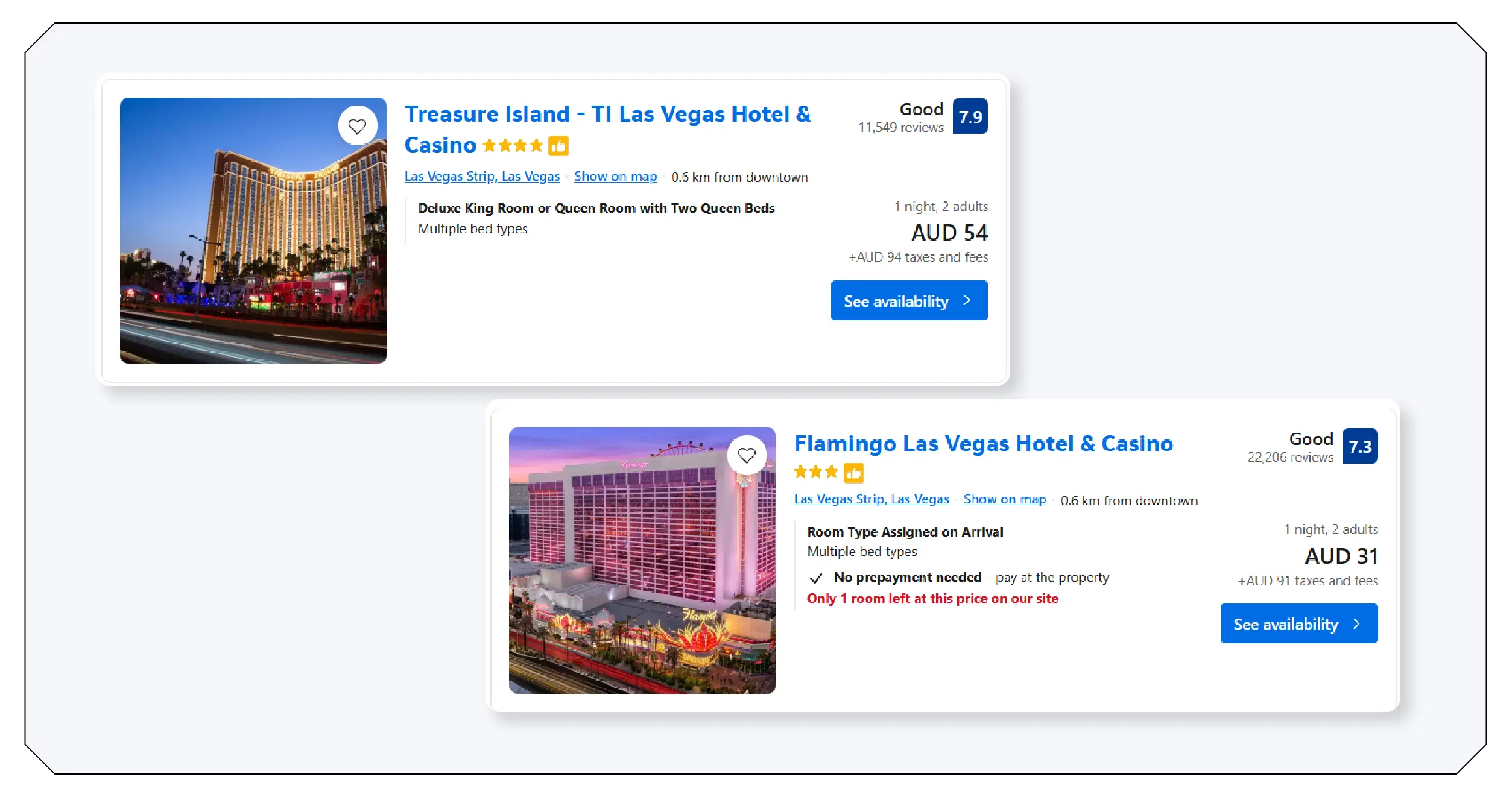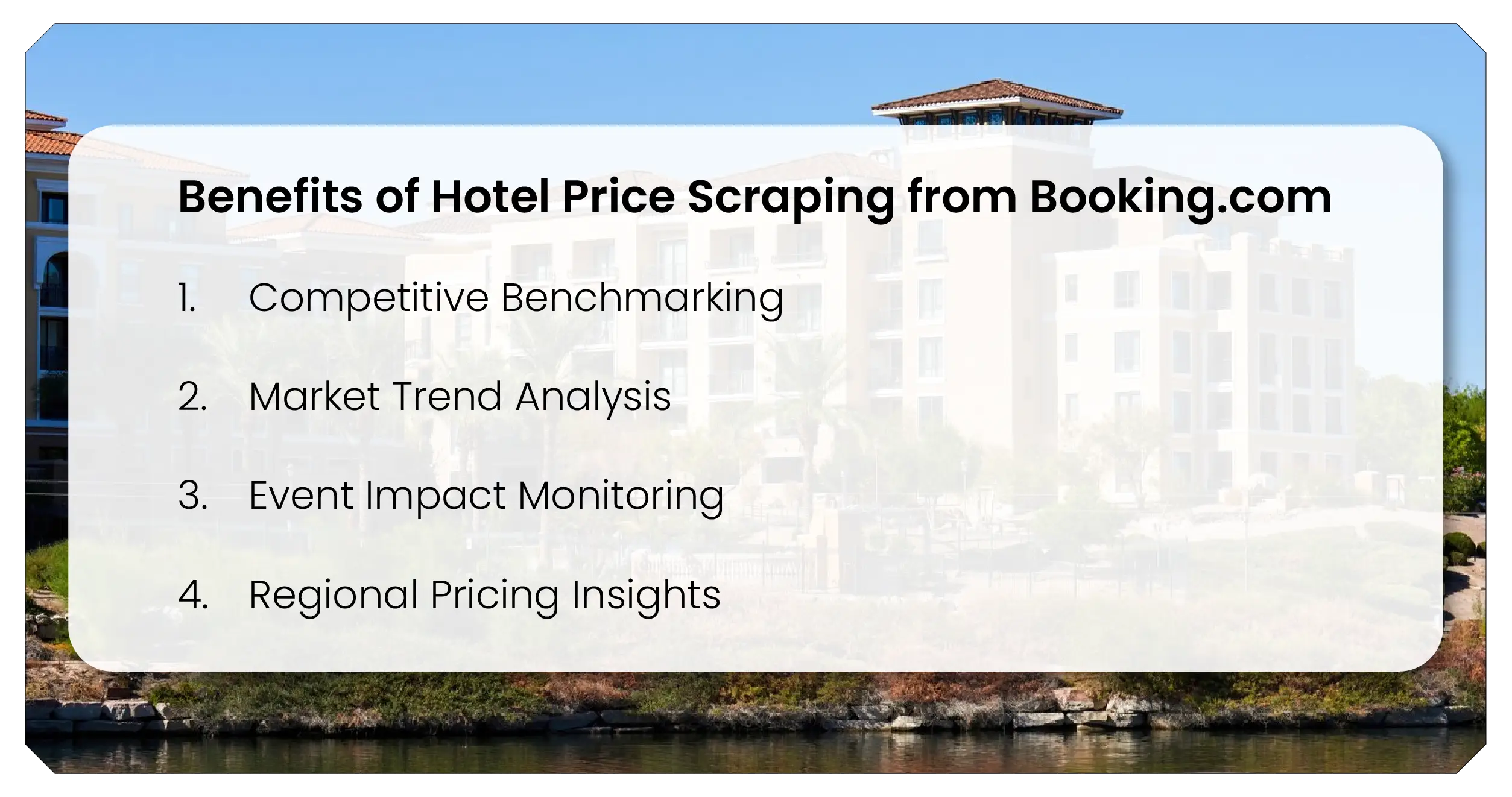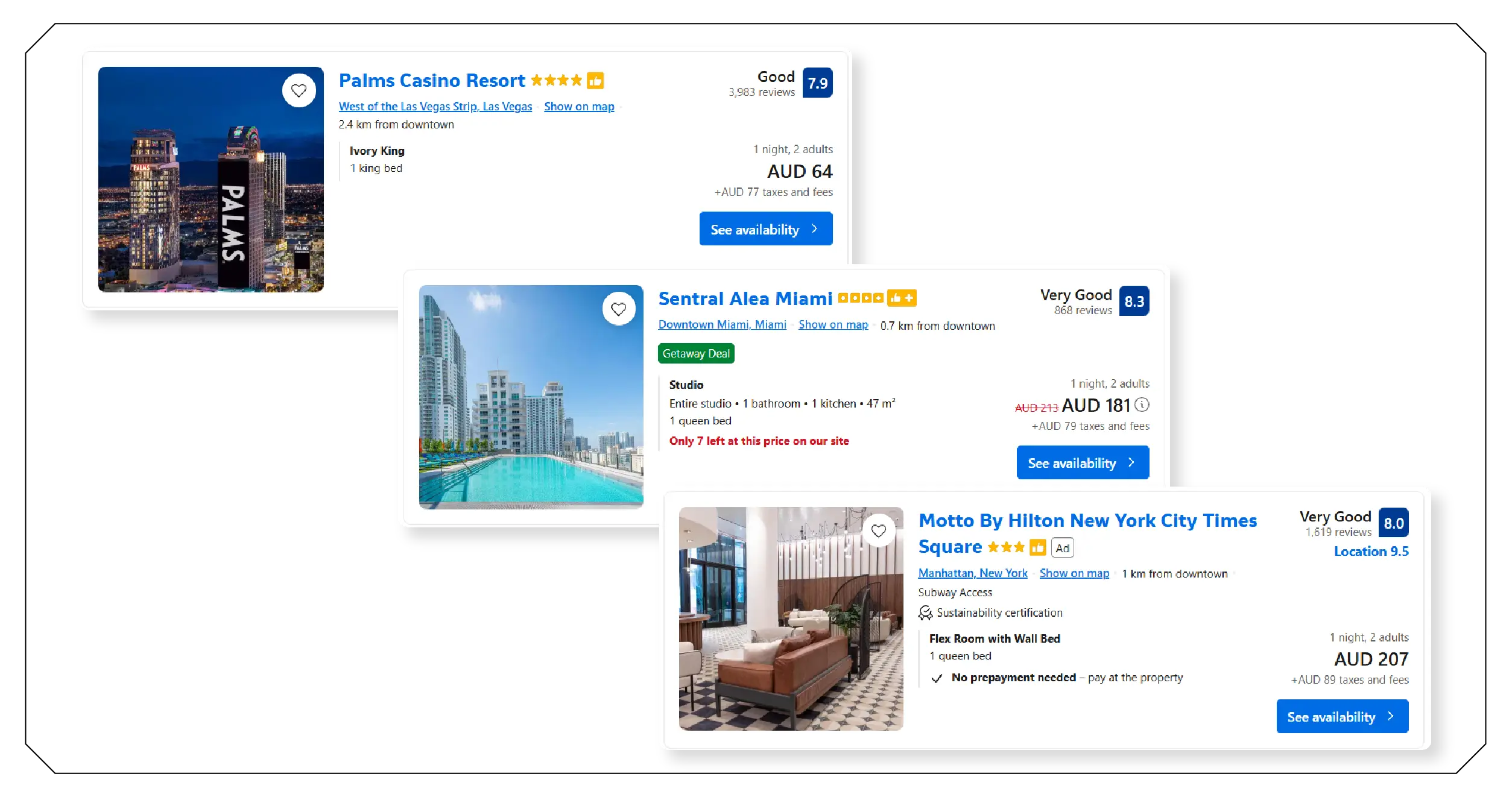How Can Hotel Price Scraping from Booking.com USA Boost Competitive Pricing Strategies?

Introduction
In today’s dynamic hospitality market, tracking and analyzing hotel prices is essential for competitive positioning and revenue optimization. Hotel Price Scraping from Booking.com USA enables hoteliers, travel agencies, and data analysts to gather actionable insights directly from one of the world’s largest online travel agencies. This process provides detailed, real-time pricing information that can help identify demand patterns, competitor strategies, and rate fluctuations across various cities. By leveraging the right tools to Scrape Booking.com Pricing Data , businesses can transform raw numbers into strategic advantages.
When it comes to city-specific analysis, some locations offer unique insights due to their diverse traveler base and seasonal demand shifts. Conducting hotel price scraping for Las Vegas helps understand how this entertainment-driven city prices its accommodations during weekdays, weekends, and special events. Similarly, pricing data from Miami and New York City reveals trends shaped by tourism seasons, business travel, and cultural happenings. Together, these three cities create a comprehensive case study for analyzing hotel pricing dynamics in the United States.
Why Focus on Las Vegas, Miami, and NYC?

These three cities are tourism and business magnets, making them ideal for hotel pricing studies:
- Las Vegas — Known for conventions, entertainment, and weekend getaways, pricing fluctuates dramatically depending on events and holidays.
- Miami — Seasonal demand spikes during winter and spring break make it a hotspot for vacation pricing analysis.
- New York City — Business travel, tourism, and global events drive constant changes in hotel rates year-round.
By collecting and comparing rate data, hotels can benchmark themselves against competitors, travel agencies can refine their offers, and analysts can spot industry trends early.
Data Extraction Process from Booking.com
Scraping hotel data from Booking.com involves structured steps to ensure accuracy and usability:
- Selecting the city and dates — Choose a representative sample of weekdays and weekends over several months.
- Defining property filters — Star rating, guest rating, amenities, location, and cancellation policies.
- Automating data collection — Using advanced scraping tools to gather rates without manual effort.
- Cleaning and structuring the dataset — Removing duplicates, ensuring consistent formats, and validating data.
For example, when we scrape Booking.com hotel prices in Miami, we might collect rates for beachfront resorts, city-center hotels, and budget-friendly hostels, then compare how each segment behaves across dates.
The Role of Real-Time Data in Hotel Pricing
The hospitality market is highly responsive to demand changes. Real-Time Travel App Data Scraping Services allow continuous tracking of hotel rates, ensuring decisions are based on the most up-to-date information. Real-time scraping can reveal:
- Sudden price increases before major events.
- Discount trends during low occupancy periods.
- Competitive undercutting in slow travel seasons.
These insights help revenue managers react quickly, adjust pricing strategies, and maximize occupancy and profitability.
Benefits of Hotel Price Scraping from Booking.com

When businesses Scrape Hotel Data From Booking.com , they gain several advantages:
- Competitive Benchmarking — Understand how your rates compare with competitors in the same city and category.
- Market Trend Analysis — Identify seasonal highs and lows, and adjust strategies accordingly.
- Event Impact Monitoring — Track rate changes during conferences, festivals, and holidays.
- Regional Pricing Insights — Discover how location influences rate structures within a city.
City-by-City Analysis

Las Vegas Hotel Pricing Insights
In Las Vegas, hotel prices are highly event-driven. On weekends with major boxing matches, music festivals, or conventions, rates can skyrocket by over 200%. Weekdays, however, often offer significantly lower rates as leisure demand drops. Scraping data for various star categories reveals how luxury properties capture premium pricing while budget hotels maintain stable rates to attract consistent occupancy.
>Miami Hotel Pricing Insights
Miami’s hotel market is seasonal, with peak rates during winter when tourists escape colder climates. Spring break and music festivals also drive short-term spikes. By using Web Scraping Booking.com Hotels Data , analysts can compare beachfront versus downtown rates, revealing that beachfront resorts tend to hold premium pricing even during off-season. In contrast, downtown hotels offer greater discounts to attract local business travelers.
New York City Hotel Pricing Insights
NYC’s hotel market is unique for its constant demand from both business and leisure travelers. High-profile events like New York Fashion Week or UN General Assembly sessions cause significant rate surges. Weekday rates often outpace weekend rates due to corporate bookings. By leveraging a Hotel Price Comparison API , hotels can monitor competitor moves and ensure their rates remain attractive while maintaining profitability.
Competitive Analysis Through Scraping
Scraping hotel prices is not just about knowing numbers — it’s about understanding competitive positioning.
- Identify Undercutting — Spot competitors offering lower rates for the same amenities and location.
- Promotional Trends — See how discounts are applied before or after high-demand periods.
- Occupancy Strategies — Discover how competitors adjust rates to fill rooms during slower periods.
These insights help businesses remain competitive without unnecessary price drops that hurt profit margins.
Technical Considerations in Hotel Price Scraping
While scraping hotel data is powerful, it must be done correctly:
- Avoid server overload — Use polite scraping practices and respect robots.txt guidelines.
- Ensure data accuracy — Cross-check data points from multiple requests to minimize errors.
- Maintain compliance — Follow local data collection regulations.
Using automated solutions for scraping Booking.com hotel prices in NYC ensures that data collection is both efficient and compliant, reducing the risk of service interruptions.
Integrating Scraped Data with Business Systems
Once the data is collected, it can be integrated into:
- Revenue management systems — For dynamic pricing adjustments.
- Market research dashboards — To visualize trends and identify opportunities.
- Business intelligence tools — To correlate hotel pricing with booking patterns, customer reviews, and market conditions.
For instance, when businesses scrape Booking.com for USA hotel rate insights, they can merge this information with booking data to understand the relationship between pricing changes and occupancy rates.
Future Trends in Hotel Price Scraping
AI-driven scraping and predictive analytics are the following significant steps. With hotel booking data analysis USA, businesses can transition from reactive to predictive strategies, forecasting rate changes before they happen. By training models on historical data, machine learning algorithms can identify likely future spikes or drops, allowing hotels to prepare marketing campaigns and adjust rates proactively.
The increasing use of USA hotel data scraping for pricing intelligence also means businesses can track global trends, not just local competition. For example, comparing how Las Vegas reacts to large conventions versus how Miami responds to music festivals can reveal universal patterns in traveler behavior.
How Travel Scrape Can Help You?
- Real-Time Competitive Insights — Our scraping solutions provide up-to-the-minute hotel pricing data, enabling businesses to respond instantly to competitor rate changes and market shifts.
- City-Specific Pricing Intelligence — We deliver targeted data for major travel destinations, helping clients understand unique pricing patterns in high-demand cities and tourist hubs.
- Multi-Platform Data Coverage — Our tools collect rates from multiple OTAs, offering a complete market view and ensuring price parity across booking channels.
- Customizable Data Outputs — Clients receive clean, structured datasets tailored to their preferred formats for seamless integration into revenue management systems.
- Predictive Pricing Analysis — By combining historical data with AI, we help forecast rate trends, giving clients a strategic edge in competitive hotel markets.
Conclusion
Hotel price scraping across Las Vegas, Miami, and New York City delivers a detailed, data-driven understanding of competitive pricing strategies and market trends. By adopting structured, compliant, and scalable scraping methods, businesses can transform public OTA data into actionable intelligence. Whether it’s for revenue optimization, competitive benchmarking, or seasonal trend forecasting, this approach offers a clear advantage in the evolving travel industry.
By integrating insights from tools to scrape Booking.com for USA hotel rate insights, companies can refine their strategies with precision. Through hotel booking data analysis USA, they gain a deeper understanding of market patterns, and with USA hotel data scraping for pricing intelligence, they can stay ahead of the competition in one of the most dynamic industries in the world.
Ready to elevate your travel business with cutting-edge data insights? Get in touch with Travel Scrape today to explore how our end-to-end data solutions can uncover new revenue streams, enhance your offerings, and strengthen your competitive edge in the travel market.